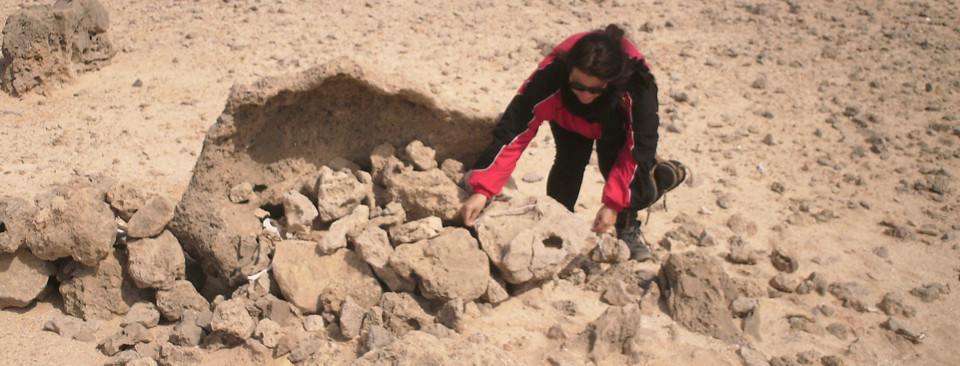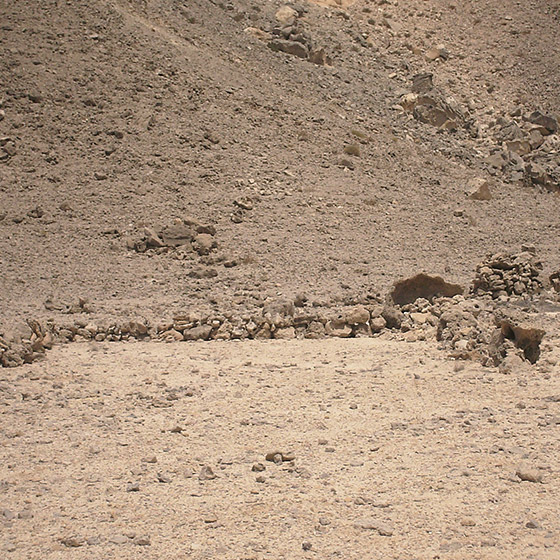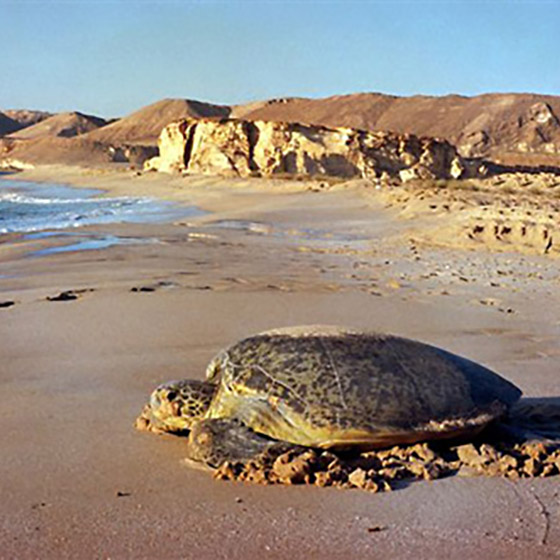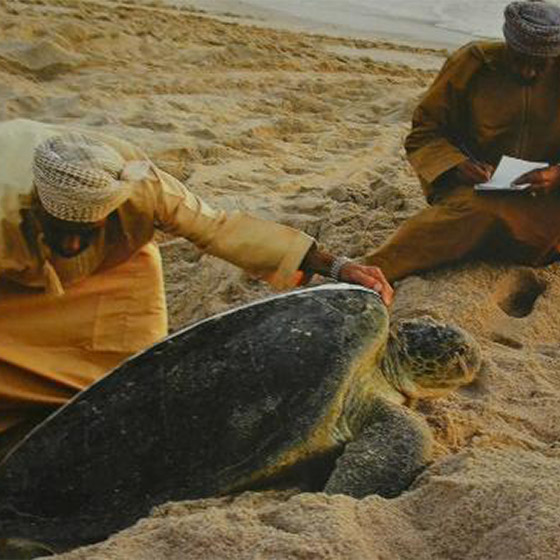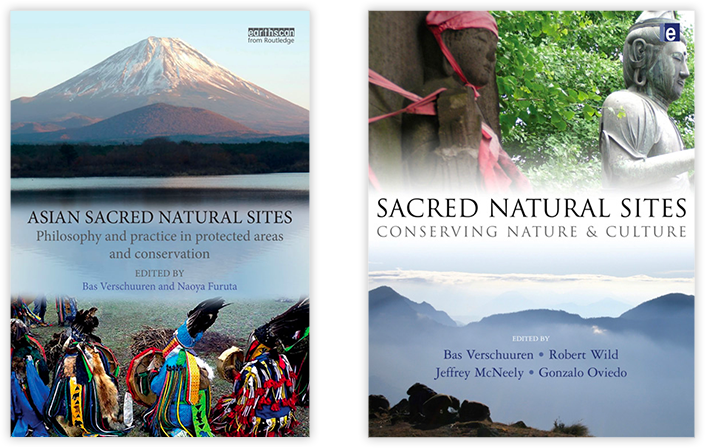"நம் மதத்தில், சகிப்புத்தன்மை உள்ளது, ஒழுக்கம் மற்றும் வெளிப்படைத்தன்மை, மேலும் மதிப்பிற்குரிய குர்ஆன் அறிவு மற்றும் சிந்தனையை குறிக்கிறது. அதன் வசனங்கள் சும்மா உட்கார்ந்திருப்பதை அழைக்கவில்லை, சிந்திக்காமல், அல்லது கண்மூடித்தனமாக வாழ்க்கையை கடந்து செல்லுங்கள். இதுவரை இருந்ததில்லை, எந்த நேரத்திலும், விசாரணை அல்லது அறிவைத் தேடுவதற்கு எதிராக".
- அவரது மாண்புமிகு சுல்தான் கபூஸ், ஓமன் ஆட்சியாளர், நீங்கள் சுல்தான் கோபோஸ் பல்கலைக்கழகம், மீது 02/05/2000.
தள
ஓமானில் உள்ள அரேபிய தீபகற்பத்தின் கிழக்கு முனையில் ராஸ் அல் ஹத் இயற்கை இருப்பு மற்றும் முக்கியமான பண்டைய வர்த்தக நகரமான ரஸ் அல் ஹாட் அமைந்துள்ளது.. இருப்பு ஒரு பகுதியை உள்ளடக்கியது 120 கி.மீ., கடற்கரையில் 42 கிமீ நீளம் கொண்டது. இந்த இருப்பு வடக்கில் ஓமன் வளைகுடாவையும் கிழக்கில் அரபிக் கடலையும் எல்லையாகக் கொண்டுள்ளது. ராஸ் அல் ஹாட் நகரம் கிழக்கு ஆபிரிக்காவிற்கு இடையே ஒரு வர்த்தக மையமாக இருந்தது, இந்திய துணைக்கண்டம் மற்றும் அரேபிய தீபகற்பத்தில் மற்ற இடங்களில். பண்டைய குடியேற்றங்கள், மோனோலித்கள் மற்றும் டிரிலிதான்கள் இப்பகுதியில் ஆரம்பகால மனித இருப்பை உறுதிப்படுத்துகின்றன - அவற்றில், அருகிலுள்ள ராஸ் அல் ஜின்ஸ் கிராமத்தில் கடல் ஆமையைப் போற்றும் ஒரு பழங்கால அடையாள நினைவுச்சின்னம்.
அச்சுறுத்தல்கள்
பாதுகாக்கப்பட்ட பகுதியில் அமைந்திருந்தாலும், எந்த ஒரு ஆன்மிஸ்ட் பீடமும் இஸ்லாமிய சமுதாயத்தில் தெளிவாக ஆபத்தில் உள்ளது. மக்கள் அதை உண்மையில் என்னவாகக் கருதினால் ஒழிய - கடந்த காலத்தின் நினைவுச்சின்னம், தற்போதைய மதப் பழக்கவழக்கங்களைப் பற்றிய சிறிய குறிப்புடன். மேலும் வடக்கே அரேபிய தீபகற்பத்தில், இரும்பு வயது பாம்பு வழிபாட்டின் ஆதாரங்களும் சமீபத்தில் பதிவு செய்யப்பட்டுள்ளன, மற்றும் ஒரு புதிய கற்கால துகோங் (டுகோங் டுகோங்) அண்டை நாடான ஐக்கிய அரபு எமிரேட்ஸில் உள்ள அகப் தீவிலும் சரணாலயம் சமீபத்தில் விவரிக்கப்பட்டது.
பார்வை
ராஸ் அல் ஹத் நேச்சர் ரிசர்விலுள்ள கடந்த கால மற்றும் தற்போதைய சமூகங்கள் இரண்டும் இயற்கையோடு இயைந்து வாழ்கின்றன மற்றும் கடல் ஆமைகளின் தயாரிப்புகளையே பெரிதும் நம்பியிருக்கின்றன., வர்த்தகம், மற்றும் புராண குணங்கள். இந்தப் பண்பாட்டைப் பாதுகாப்பது பிராந்தியங்களின் பாதுகாப்பு மற்றும் சுற்றுலாவின் நிலையான மேலாண்மைக்கு பலமாக இருக்கும் என்று நம்பப்படுகிறது..
சூழலியல் பல்லுயிரினமும்
ராஸ் அல் ஹத் ரிசர்வ் மணல் கடற்கரைகளால் வகைப்படுத்தப்படுகிறது, மணல் திட்டுகள், ஹைப்பர்சலைன் சமவெளி, சுண்ணாம்பு பாறைகள், கடலோர சமவெளி, ஹவாசினா மலைகள், மற்றும் கருப்பு சதுப்புநில காடுகளை ஆதரிக்கும் இரண்டு கடலோர தடாகங்கள் (அவிசெனியா மெரினா). மணல் நிறைந்த கடற்கரைகள் குறைந்த பட்சம் கூடு கட்டுவதற்கு இடமாக இருக்கும் 15,000 பச்சை கடல் ஆமைகள் (செலோனியா மைடாஸ்) வருடத்திற்கு. இப்பகுதியானது கூடு கட்டுவதற்கு முக்கியமான இடங்களையும் வழங்குகிறது 130 பறவை இனங்கள், மற்றும் பல உள்ளூர் அரேபிய பூனை மற்றும் நாய் இனங்கள் உள்ளன.
பொறுப்பாளர்களும்
ஆனிமிசம் என்பது ஆசிய இன ஆன்மீகத்தில் ஒரு பொதுவான அங்கமாகும், மற்றும் யூத மதத்தின் பிறப்பிடத்திலும் கூட, கிறிஸ்தவமும் இஸ்லாமும் அதற்கான ஆதாரங்களைக் காண்கிறோம். வருந்தத்தக்கது, கடல் ஆமை பலிபீடத்தின் புனித தளத்தை விவரிப்பதன் மூலம் அது காணாமல் போனதற்கு நாங்கள் பங்களிக்கிறோம் என்பதை நாங்கள் புரிந்துகொள்கிறோம், ஏனெனில் இஸ்லாமிய சமூகத்தில் இத்தகைய நடைமுறைகள் ஏற்றுக்கொள்ளப்படாது. எனினும், மத மற்றும் அரசாங்க அதிகாரிகள் அதன் நிகழ்வின் வரலாற்று சூழலைப் புரிந்துகொள்வார்கள் என்று நம்புகிறோம், கடந்த காலத்திலிருந்து இந்த உள்ளூர் கலாச்சார பாரம்பரியம் மனித வரலாற்றின் பண்டைய நினைவுச்சின்னமாக பாதுகாக்கப்படலாம் என்று நாங்கள் நம்புகிறோம், ராஸ் அல் ஜின்ஸின் உள்ளூர் சமூகத்தால் பாதுகாக்கப்படுகிறது.
கடல் ஆமை வழிபாடு இஸ்லாத்திற்கு முந்தைய காலத்தில் ஒரு பொதுவான நடைமுறையாக இருந்திருக்கலாம், இப்பகுதியில் மிருகக்காட்சிசாலை பரவலாக இருந்தபோது, ஆனால் இந்த தெய்வத்திற்கு புதிய பிரசாதங்கள் இருப்பதும் மிக சமீபத்திய பங்கைக் குறிக்கிறது. அப்பகுதியின் மானுடவியலைப் பார்த்து, இன்று யார் பிரசாதம் செய்கிறார்கள், இந்த மக்களின் மரபுகள் என்ன போன்ற கேள்விகளுக்கு இன்னும் பல வேலைகள் செய்யப்பட வேண்டும்.? அவர்களின் சமூகம் எவ்வாறு ஒழுங்கமைக்கப்பட்டுள்ளது மற்றும் அவர்கள் சடங்குகளை யார் கடைப்பிடிக்கிறார்கள்?
ஒன்றாக வேலை
ராஸ் அல் ஹத் நேச்சர் ரிசர்வ் உள்ளூர் நகராட்சியால் மட்டும் நிர்வகிக்கப்படுகிறது, ஆனால் பல தொல்பொருள் இடங்களைக் கொண்ட பாதுகாக்கப்பட்ட பகுதியாகும், இது சுற்றுச்சூழல் அமைச்சகத்தால் நிர்வகிக்கப்படுகிறது, சுற்றுலா அமைச்சகம், மற்றும் கலாச்சாரம் மற்றும் பாரம்பரிய அமைச்சகம்.
"எண்ணம் பலவகைப்படும், திறந்த மற்றும் வெறித்தனம் இல்லாதது, தலைமுறைகளை கட்டியெழுப்ப இது ஒரு சரியான மற்றும் உறுதியான அடிப்படையாக மாறும், நாடுகளின் முன்னேற்றம், மற்றும் சமூகங்களின் முன்னேற்றம். நெகிழ்வின்மை, தீவிரவாதம், மற்றும் ஒழுக்கமின்மை இவை அனைத்திற்கும் எதிரானது, மற்றும் அத்தகைய கருத்துக்களை ஏற்றுக்கொள்ளும் சமூகங்கள், அவற்றின் இறுதி அழிவின் விதைகளை மட்டுமே தங்களுக்குள் சுமந்து செல்கின்றன". - அவரது மாண்புமிகு சுல்தான் கபூஸ், ஓமன் ஆட்சியாளர், ஓமன் கவுன்சிலுக்கு, மீது 31/10/2011.
அதிரடி
ஆமை கடற்கரைகளுக்கான அணுகல் சுற்றுச்சூழல் அமைச்சகம் மற்றும் சுற்றுலா அமைச்சகத்தின் ராஸ் அல் ஜின்ஸ் அறிவியல் மற்றும் பார்வையாளர்கள் மையம் ஆகியவற்றால் கட்டுப்படுத்தப்பட்டு மேற்பார்வையிடப்படுகிறது.. சுற்றுச்சூழல் அமைச்சகம் மற்றும் கலாச்சாரம் மற்றும் பாரம்பரிய அமைச்சகத்தின் மேற்பார்வையின் கீழ், இப்பகுதியில் வனவிலங்கு மற்றும் கலாச்சார பாரம்பரியம் குறித்த ஆராய்ச்சி நடவடிக்கைகளை மேற்கொள்ளும் விஞ்ஞானிகள்.
கொள்கை மற்றும் சட்டம்
ராஸ் அல் ஹத் நேச்சர் ரிசர்வ் மற்றும் அதன் வனவிலங்குகள் அரச ஆணையால் பாதுகாக்கப்படுகின்றன 25/96, அன்று வெளியிடப்பட்டது 23/4/1996 அவரது மாட்சிமை சுல்தான் கபூஸ் மூலம், ஓமானின் தற்போதைய ஆட்சியாளர். வெற்றி இல்லாமல் இருந்தாலும், அன்று 25/05/2013, யுனெஸ்கோவிற்கான ஓமன் சுல்தானகத்தின் நிரந்தர பிரதிநிதிகள் ராஸ் அல் ஹாட் ஆமை காப்பகத்திற்கான யுனெஸ்கோ பாரம்பரிய தள அந்தஸ்துக்கான விண்ணப்பத்தை சமர்ப்பித்தனர்.
மேலாண்மை திட்டங்கள்
இப்பகுதிக்கு பல மேலாண்மை திட்டங்கள் தயாரிக்கப்பட்டு செயல்படுத்தப்பட்டு வருகிறது. நாட்டின் எதிர்காலப் பொருளாதாரத்தை ஆதரிப்பதற்கான அடித்தளங்களை அமைக்க பெரும் முயற்சிகள் இயக்கப்பட்டுள்ளன, முதன்மையாக பெட்ரோ கெமிக்கல் அல்லாத வளங்களை அடிப்படையாகக் கொண்டது; மற்றும் சுற்றுச்சூழல் சுற்றுலா உண்மையில் ஒரு சாத்தியமான விருப்பமாகும். இது மிகவும் கடினமாக இருக்கும், சில நேரங்களில், உள்ளூர் சமூகங்களின் சமூக-பொருளாதார கோரிக்கைகள் மற்றும் இயற்கை வளங்களின் அதிகப்படியான சுரண்டலுக்கு இடையே ஒரு நுட்பமான சமநிலையை உருவாக்க.
பாதுகாப்பு கருவிகள்
முதல் 1991, பூங்கா காவலர்கள் அப்பகுதியில் ரோந்து செல்கின்றனர், மற்ற கடற்கரைகளில் சுற்றுச்சூழலின் தாக்கங்களைக் குறைக்க ராஸ் அல் ஜின்ஸ் நார்த் கடற்கரையில் ஆமைகளைப் பார்க்கும் நடவடிக்கைகள் கட்டுப்படுத்தப்பட்டுள்ளன.. இருந்து 1991 செய்ய 2008, 9,483 ind. ராஸ் அல் ஜின்ஸில் வழிகாட்டப்பட்ட ஆமைகளைப் பார்ப்பதற்காக ஆண்டு வந்தார், சுற்றுச்சூழல் அமைச்சகம் சுற்றுலாப் பயணிகளுக்கான நிரந்தர முகாம் பகுதியைக் கொண்டிருந்தது. இருந்து 2009, ராஸ் அல் ஜின்ஸ் அறிவியல் & பார்வையாளர் மையம், சுற்றுலா அமைச்சகத்தால் அமைக்கப்பட்டது, சுற்றுப்பயணம் செய்து பார்வையாளர்களுக்கு உணவளித்து வருகிறது.
முடிவுகள்
கடல் ஆமைகள் காலங்காலமாக உள்ளூர் சமூகத்தில் முக்கிய பங்கு வகித்து வருகின்றன என்பது தெளிவாகிறது. புரதம் மற்றும் பல்வேறு கருவிகளுக்கான மூலப்பொருளின் ஆதாரமாக, கடல் ஆமைகள் கடந்த கால பொருளாதார பரிவர்த்தனைகளில் ஒரு முக்கிய பகுதியாக இருந்தன, மற்றும் புராண குணங்களைக் கொண்டிருந்தது. தற்போது, குறைந்தபட்சம் 15,000 வருடாந்திர பெண் பச்சை ஆமைகள் செலோனியா மைடாஸ் ராஸ் அல் ஜின்ஸ் கிராமத்தில் மட்டும் இரண்டு முக்கிய கடற்கரைகளில் கூடு கட்டுகின்றன. கடல் ஆமை பாதுகாப்பு உள்ளூர் சமூகத்தின் முக்கிய வருமான ஆதாரமாகும், பூங்கா காவலர்கள் என பலர் ஈடுபட்டுள்ளனர், சுற்றுலா வழிகாட்டிகள், அல்லது அல் ஜின்ஸ் அறிவியல் மற்றும் பார்வையாளர் மையத்தில் பிற பாத்திரங்களைக் கொண்டிருத்தல். எப்படியோ, ராஸ் அல் ஹத் நேச்சர் ரிசர்வ் மக்களுக்கு கடல் ஆமைகள் இன்னும் மந்திரம்.
- மென்டோன்கா, வி., அபி-அவுன், பி, எல் பரடே, எம். (2014) ராஸ் அல் ஹாட் ரிசர்வ் கடல் ஆமைகளின் கடந்த கால மற்றும் தற்போதைய சமூக மற்றும் கலாச்சார முக்கியத்துவம், கிழக்கு அரேபிய தீபகற்பம். வெர்ஷூரனில், பி, Furuta, என். (ஈடிஎஸ்) ஆசிய புனிதமான இயற்கை தளங்கள்: பாதுகாக்கப்பட்ட பகுதிகளுக்கு அடிப்படை முக்கியத்துவம் வாய்ந்த ஒரு பண்டைய ஆசிய தத்துவம் மற்றும் நடைமுறை. IUCN யுனெஸ்கோ, WCPA-ஜப்பான், அகிதா.
- மென்டோன்கா, வி., அல்-சாதி, எஸ், அல்-கியூமி, ஏ., எர்சினி, கே. (2010). பச்சை ஆமைகளுக்கு இடையிலான தொடர்பு (செலோனியா மைடாஸ்) மற்றும் நரிகள் (நரிகள் அரேபிய நரிகள், நரி ரூபெல்லி சபேயா, மற்றும் வல்ப்ஸ் கானா) வடமேற்கு இந்தியப் பெருங்கடலில் ஆமை கூடு கட்டும் மைதானத்தில்: ராஸ் அல் ஹாட் ஆமை காப்பகத்தில் கடல் ஆமைகள் கூடு கட்டும் நடத்தையில் நரி சமூகத்தின் தாக்கங்கள், ஓமன். விலங்கியல் ஆய்வுகள், தொகுதி. 49, பக். 437-452.
- வந்தா மென்டோன்கா, வி., அபி-அவுன், பி, எல் பரடே, எம். 2016. மேற்கு ஆசியாவில் உள்ள அரேபிய தீபகற்பத்தில் உள்ள உள்ளூர் சமூகங்களுக்கு கடல் ஆமைகளின் கடந்த கால மற்றும் தற்போதைய உயிரியல் கலாச்சார முக்கியத்துவம். ஆம்: ஆம்: வெர்சுரென் & ஃபுருடா (ஈடிஎஸ்.) ஆசிய புனிதமான இயற்கை தளங்கள்: பாதுகாக்கப்பட்ட பகுதிகள் மற்றும் பாதுகாப்பு தத்துவம் மற்றும் பயிற்சி. ரூட்லெட்ஜ், லண்டன். பக். 234-245.
- ராஸ் அல் ஜின்ஸ் அறிவியல் & பார்வையாளர் மையம்: http://www.rasaljinz-turtlereserve.com/gallery/

